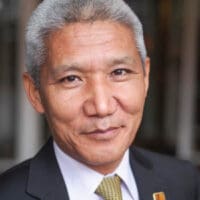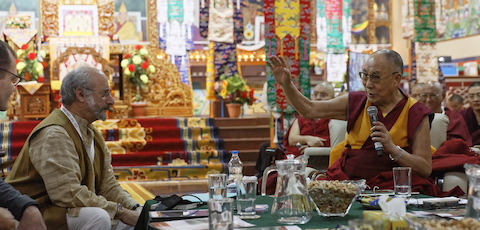Filmed during Mind & Life Institute’s “Mind & Life XXX: Perception, Concepts, and Self” on December 15, 2015.
Examining the Perception of Body Sensations: Correlating Aspects of Perceptual Processes with Mind, Self, and Basic Physiology
SPEAKER: Catherine Kerr
Recent scientific findings suggest that perception of body sensations, such as a lump in the throat or a twinge in the hand, takes place precisely at the interface between mind and body. In this presentation, Kerr discuss work by her lab and others that shows how focused mental attention rapidly shapes perception of body sensations by influencing neurons in the basic somatosensory processing network in the brain. In parallel with this basic science, her work also suggests that mindfulness practice enhances the mind’s ability to control the “volume” of these simple body-related neuronal signals. In addition, Kerr describes a higher-order body perception network in the brain that integrates touch, joint and muscle sensations and visual images of the body, to produce a 3-dimensional ego-centric map of the body in space. To examine this 3-D body map, scientists have created illusions that probe body perception mechanisms. The rubber hand illusion, in which participants are tricked into “disowning” their real hand and adopting the rubber hand as if it were their own, is especially relevant for illustrating the perception of complex body sensations. Recent studies of the rubber hand illusion suggest that perception of complex, 3-dimensional multisensory body feelings occurs explicitly at the mind-body interface, as this perception is correlated with both self-processing and with basic physiological mechanisms such as temperature regulation. Finally, Kerr concludes by asking whether the neuroscience of body perception networks can provide a tractable basis for investigating the effects of contemplative practices (including Tibetan, Chinese and Zen practices) that focus on changing the 3-dimensional experience of the body in space through attention to posture and to internal spatial “channels” of sensation and “energy.”
Four Aspects of Concept Formation in the Buddhist Epistemological Tradition
SPEAKER: John Dunne
Drawing primarily on Sanskrit sources, this presentation focuses on concept formation as articulated in the Buddhist epistemological tradition following Dharmakīrti (seventh century). According to realist accounts, concepts correspond to real, extra-mental universals that allegedly constitute real categories or classes in the world. In contrast, Dharmakīrtian theorists hold that all classes and categories are merely constructed through a process of concept formation. One feature of the Dharmakīrtian approach is that concepts generally depend upon sensory experience. Hence, concepts are formed through (and intertwined with) sensory modalities in a manner similar to contemporary grounded cognition theory. A second feature is that, since members of a class do not actually share any universal features, the formation of that class proceeds by excluding non-members while ignoring variability across class members. These twin actions of excluding and ignoring occur within a goal oriented framework structured by approach and avoidance. Thus, another key issue is the way that concepts relate to goal-oriented behavior. Third, concepts involve the primitive features of language, even though they themselves are not necessarily linguistic. The Dharmakīrtian approach thus suggests that the three aspects of concept formation noted above may be foundational to language itself. Finally, concepts stand in a web of inferential relations, such that every concept implies others and is implied by others. These relations are often erroneous, in that they do not track actual features of the world. A key issue here is the problem of correcting beliefs that are based on false inferential relations, and the central role that philosophy and meditation practice plays therein.
MODERATOR: Jay Garfield
INTERPRETER: Thupten Jinpa
PANELISTS:
His Holiness the 14th Dalai Lama
Lera Boroditsky
Richard J. Davidson
Roshi Joan Halifax
Wendy Hasenkamp
Bryce Johnson
Tenzin Lhadron
Geshe Lhakdor
Thabkhe Lodroe
Geshe Dadul Namgyal
Werner Nater
Geshe Lobsang Tenzin Negi
Vasudevi Reddy
Matthieu Ricard
Yangsi Rinpoche
Pawan Sinha
Professor Geshe Yeshe Thabke
Khenpo Sonam Tsewang
David Vago
Christy Wilson-Mendenhall
Carol Worthman






